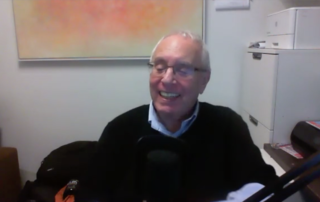e60—James Bovard, libertarian journalist
James Bovard (@JimBovard) discusses the latest news on the COVID front, the events of Jan. 6, the Deep State’s tactics against libertarians and other dissenters, and the role of the corporate media. Links to James Bovard's books James Bovard articles mentioned this episode: "The Feds are Coming for Libertarians" "My
e59—Patrick Newman, Mises Institute fellow and economics professor at Florida Southern College
Patrick Newman discusses why the Austrian approach to economics is still a minority view in academia, the similarities between the 2008 crash and the 2021 economy, and the parallels between the Progressive Era and the “woke” corporatism of today. Join Patrick Newman—along with Tom Woods, Dave Smith, Michael Boldin, Scott
e58—Mises Caucus state organizers Linnea Gabbard, Will Hobson, and Celicia Slafter
Linnea Gabbard (Arkansas), Will Hobson (Oregon), and Celicia Slafter (Florida) explain why they became state organizers for the Libertarian Party Mises Caucus, what that role entails, and the unique issues in each of their states. To get more involved with the Mises Caucus, visit the the Meet the Team page and scroll
e57—Reinita Susman and Nick Nikides, filmmakers of the Mises Caucus documentary The Unseen
Reinita Susman and Nick Nikides are the writer and director, respectively, of The Unseen, a documentary film from LPMC California's media team about four small business owners struggling to survive during the 2020 lockdowns. Watch the The Unseen trailer here: The only screening currently scheduled is the one
e56—Sheldon Richman, author of Coming to Palestine and executive editor of The Libertarian Institute
Sheldon Richman explains the history of Palestine and the State of Israel, and why that history is crucial to understanding the present-day conflict. Coming to Palestine by Sheldon Richman Sheldon Richman recommends Mondoweiss for current events news and analysis about the history of Palestine and the State of Israel and,
e55—Dr. Ron Paul, libertarian hero
Dr. Ron Paul looks back on his career and shares stories about his early encounters with libertarian icons and their works, his experiences with the LP, and the need for the liberty movement to have a positive culture. Watch this episode on Facebook or YouTube. Visit The Ron Paul Institute
e54—Gerard Casey, libertarian philosopher and author of Freedom’s Progress? A History of Political Thought
Gerard Casey discusses his recent trilogy of books (Hidden Agender, After #MeToo, and ZAP: Free Speech and Tolerance in the Light of the Zero Aggression Principle) exploring the political climate around free speech and tolerance, his lifelong journey toward libertarianism and Christianity, and the history of the idea of liberty—including
e53—Lyman Bishop, founder and CEO of Hoplite Armor
Lyman Bishop (founder, owner, and CEO of Hoplite Armor (855-ARMOR-01)) shares his story of creating innovative body armor products for use by “the common man,” his policy of not selling to law enforcement departments or militaries, and his 2020 run for Montana governor as a Libertarian—as well as his possible
e52—Angela McArdle, candidate for chair of Libertarian National Committee
Angela McArdle is a Mises Caucus board member and the chair of the Libertarian Party of Los Angeles County. She shares her decision to run for chair of the Libertarian National Committee, the need for LP national to have much better messaging, and the response she’s getting as she campaigns
e51—Scott Beyer, urban affairs journalist at the Market Urbanism Report
Scott Beyer is an urban affairs journalist who owns and manages the Market Urbanism Report, which reports on attempts to help cities function better through free-market policy. Scott discusses what’s working and what’s not in American cities and the challenge of getting city insiders to consider market-oriented reforms. He also
e50—Dan McKnight, chairman and founder of BringOurTroopsHome.US
Dan McKnight shares how his experiences in the US Marines, the US Army, and the Idaho National Guard—plus reading Scott Horton—led him to found BringOurTroopsHome.US and help create and lobby for the Defend the Guard act, which would use decentralization to rein in American foreign policy. He also shares what
e49—Walter Block, economics chair at Loyola University
The prolific Walter Block discusses his groundbreaking Defending the Undefendable series, an area of disagreement with his mentor Murray Rothbard, his thoughts on the Trump administration, and his take on the pandemic. From the Journal of Libertarian Studies: A Libertarian Analysis of the COVID-19 Pandemic by Walter Block Dr. Block's
e48—Dave Smith, Michael Heise, and LNC Secretary Caryn Ann Harlos
Decentralized Revolution—episode 48 LPMC Chair Michael Heise, Dave Smith (Part of the Problem), and LNC Secretary Caryn Ann Harlos got together for a livestream on the LMPC social media pages on Friday, Feb. 12 to discuss the use of the term “takeover” to describe the Mises Caucus plan to reform the
e47—Scott Horton, author of Enough Already: Time to End the War on Terrorism
Scott Horton (The Libertarian Institute, Antiwar.com) talks about his book Enough Already: Time to End the War on Terrorism, which serves as a concise summary of American foreign policy since the Carter administration. He also offers his take on the Time magazine “Shadow Campaign” article and the incoming Biden administration,
e46—Stephan Kinsella, author of Against Intellectual Property
Stephan Kinsella is an intellectual property lawyer and author of Against Intellectual Property. In addition to IP, he shares his thoughts on the incoming administration, the GameStop story, and the work of Hans-Hermann Hoppe. StephanKinsella.com Stephan Kinsella (@NSKinsella) on Twitter Books, articles, and appearances by Stephan Kinsella: Free download of
e45—Antonia Okafor Cover, director of outreach for Gun Owners of America
Antonia Okafor Cover is the daughter of Nigerian immigrants who considered herself a liberal feminist in college, but her outlook began to change when she realized the right to self-defense is essential to personal freedom and empowerment. She went on to help enact “campus carry” legislation in Texas and
e44—Norman Singleton, president of Campaign for Liberty
Norm Singleton shares stories and insights from his time with Ron Paul’s presidential campaigns and as Dr. Paul’s legislative director in Congress, work which led to his current role at Campaign for Liberty. He also analyzes why a populist strategy is the one most likely to lead to success
e43—Eric Peters, libertarian automotive journalist
Eric Peters is a veteran automotive journalist who covers that industry from a libertarian viewpoint. In this episode, we discuss how and why the US government completely transformed the US auto industry through regulation and the likely push to ban internal combustion engines, along with some classic car movies. His
e42—Gene Epstein, Austrian economist and host of the Soho Forum debate series
Gene Epstein discusses his evolution from a “red diaper baby” to an economic journalist inspired by Mises and Rothbard before going on to talk about the damage done by the government’s response to the pandemic—and then reminds us all of reasons to be optimistic. Books discussed this episode: All on
e41—Kerry Baldwin and Dick Clark from the Libertarian Christian Institute
Kerry Baldwin and Dick Clark are—along with Norman Horn and Doug Stuart—co-authors of Faith Seeking Freedom: Libertarian Christian Answers to Tough Questions. They explain the mission of the LCI and the need for moral clarity on issues involving violence and the state. Kerry Baldwin and Walter Block debate the libertarian
e40—Michael Rectenwald, author of Thought Criminal, Beyond Woke, and Google Archipelago
Michael Rectenwald returns to Decentralized Revolution to discuss “The Google Election,” his recent talk at a Mises Institute event as well as his new dystopian novel Thought Criminal. Rectenwald is also the author of Google Archipelago, Beyond Woke, and Springtime for Snowflakes. Offer feedback and guest suggestions at communications at
e39—Sheldon Richman (Libertarian Institute), author of America’s Counter-Revolution: The Constitution Revisited
Sheldon Richman (Libertarian Institute) offers insight about America’s founding from the revolution through the ratification of the Constitution, focusing on the misinformation everyone’s taught about the Articles of Confederation, the Federalists’ open support for a government-friendly approach to interpreting the Constitution, and the Anti-Federalists’ advocacy of decentralization as a guard
e38—Connor Boyack, creator of the Tuttle Twins
Connor Boyack, who’s also founder and president of Utah’s Libertas Institute, explains how his 2014 book Feardom: How Politicians Exploit Your Emotions and What You Can Do to Stop Them can help us through the media and government’s reaction to COVID-19. He also tells us about the origins of the
e37—Jason Bassler, co-founder of The Free Thought Project
Jason Bassler tells the story of how he helped create some of the most popular pro-Liberty content of the last decade, how and why Facebook, Twitter and other big platforms have been silencing him and others, and what will need to happen to break up the Facebook monolith. The Free

